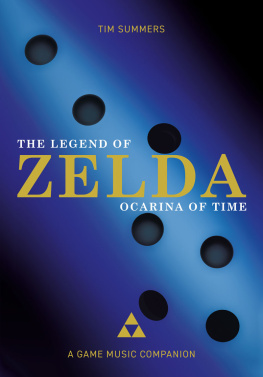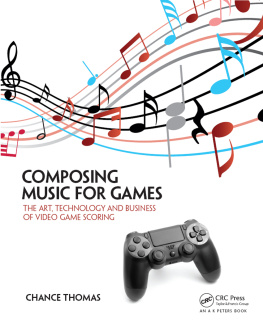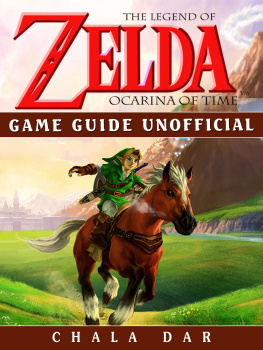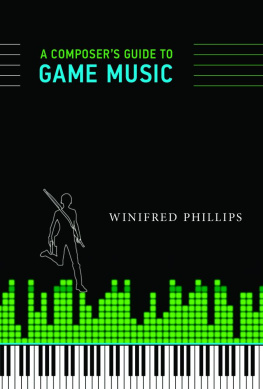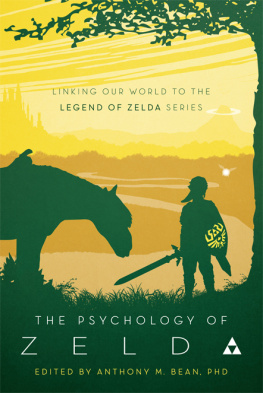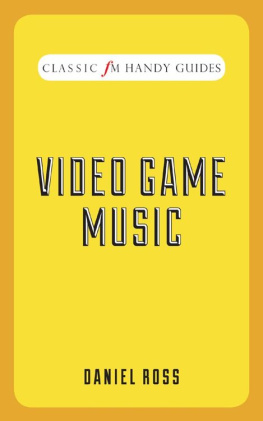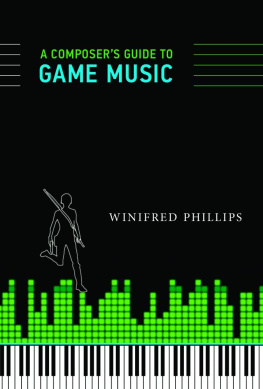The Legend of Zelda: Ocarina of Time
Studies in Game Sound and Music
Series editors: Melanie Fritsch, Michiel Kamp, Tim Summers, Mark Sweeney
Intellects Studies in Game Sound and Music publishes accessible, detailed books that provide in-depth academic explorations of topics and texts in video game audio. The books present detailed analysis, historical investigation and treatment of conceptual and theoretical issues related to game audio.
The series does not seal game audio into a scholarly suburb but is instead outward-looking: it seeks to engage game audio practitioners and researchers from a range of disciplines, including anthropology, performance studies, computer science, media studies, psychology, sociology and sound studies, as well as musicology.
The Legend of Zelda: Ocarina of Time
A Game Music Companion
Tim Summers

First published in the UK in 2021 by
Intellect, The Mill, Parnall Road, Fishponds, Bristol, BS16 3JG, UK
First published in the USA in 2021 by
Intellect, The University of Chicago Press, 1427 E. 60th Street,
Chicago, IL 60637, USA
Copyright 2021 Intellect Ltd
All rights reserved. No part of this publication may be reproduced, stored in a retrieval system, or transmitted, in any form or by any means, electronic, mechanical, photocopying, recording, or otherwise, without written permission.
A catalogue record for this book is available from the British Library.
Cover designers: Adam St. Leger-Honeybone and Holly Rose
Copy editor: Newgen KnowledgeWorks
Production manager: Emma Berrill
Typesetting: Newgen KnowledgeWorks
Print ISBN 978-1-78938-227-3
ePDF ISBN 978-1-78938-229-7
ePub ISBN 978-1-78938-228-0
Series: Studies in Game Sound and Music
ISSN: 2633-065
Printed and bound by Short Run, UK.
To find out about all our publications, please visit
www.intellectbooks.com
There you can subscribe to our e-newsletter, browse or download our current catalogue, and buy any titles that are in print.
This is a work of independent, peer-reviewed scholarship and is not an official Nintendo product.
For Mum and Dad.
Contents
This book would not have been possible without the support of staff and students at Royal Holloway University of London and University College Dublin. I am particularly grateful to the advice I have received from my wonderful colleagues at these two institutions, especially Julie Brown, Ciarn Crilly, Steve Downes, Daniel Elphick, Jonathan Godsall, Wolfgang Marx, Stephen Rose, Henry Stobart, Shzr Ee Tan and Peter Tregear. Many of the ideas in this book were developed in tandem with teaching. It has been a privilege to participate in discussions with students, especially those on the Music and Video Games course at Royal Holloway, and all of the undergraduate and postgraduate students who have taken the time to engage so enthusiastically with the subject and ideas on this topic. I must especially recognize the valuable discussions with Will Farmer, Olivia Fitton-Brown, Donal Fullam, Milly Hale, Joshua Johnson and Stephen Tatlow, all of whom helped to inform this volume in innumerable ways.
I am beyond fortunate to be part of a generous and supportive community of researchers who investigate game and film music. In particular, Michael Austin, Stephen Baysted, Karen Cook, Kevin Donnelly, William Gibbons, Elizabeth Hambleton, Andra Ivnescu, Anahid Kassabian, Elizabeth Medina-Gray, Miguel Mera, Guy Michelmore, James Newman, Dave Raybould, Richard Stevens, Isabella van Elferen and Ben Winters have encouraged and inspired this volume. Peter Franklin and Guido Heldt continue to be academic mentors and dear friends.
At Intellect Publishing, huge thanks are due to Jelena Stanovnik for her unwavering support and passion for this project since its proposal. She has also been incredibly patient through the unexpected delays of this volume. I am also grateful to Emma Berrill for her superb work shepherding this book through production and Anish Joseph Chacko for meticulous and diligent copyediting. Stephanie Lind generously reviewed the manuscript, along with another anonymous reviewer, and both sets of comments helped to significantly refine and improve the book.
One of the joys of my academic life is collaborating with the other Ludomusicology group members: Melanie Fritsch, Michiel Kamp and Mark Sweeney. These wonderful scholars continue shape every aspect of my thinking and academic activity. Explicitly and implicitly, their influence is evident throughout book. I am especially grateful to Michiel Kamp, who gave wise and insightful advice, commenting in detail on large proportions of the manuscript close to the submission deadline.
This book would not have been possible without my friends and family. Olivia Hassell, Katie Henderson, Jamie McIntyre, Hannah Patrick, Guy Wells and Craig Williams all listened with sympathetic ears and gave great emotional support. Yes, Katie, Im happy to report that the Zelda book is finally done! My family, including Anne, Huw, Mary, Andy, Sarah, Sophie and Chris have been enthused and interested, while Mochi, Ganymede and Bertie have provided much-needed perspective. Final and huge thanks must go to my partner, Adam, who has given me love, advice and encouragement beyond description throughout the long journey of this book.
This book primarily uses British musical terms. For readers more familiar with other terms, here are some explanations:
Semibreve: whole note
Minim: half note
Crotchet: quarter note
Quaver: eighth note
Semiquaver: sixteenth note
Bar: measure
Semitone: half-step
Tone: whole step
mm.: [Mlzels] metronome mark (in beats per minute)
Hey!
Listen!
Navi, my fairy companion, exclaims.
Again.
There isnt much recorded speech in The Legend of Zelda: Ocarina of Time, but Navi has a voice. She is given a limited set of important phrases. These few words spoken by our heros sidekick are repeated so often that they become etched into the players memory.
Navi exhorts me to Listen! She wants to give me advice about the next destination on my quest. But she might as well be telling me to keep my ears open and listen to the games music. So significant is music to Ocarina of Time that listening is a core part of the experience of playing the game. As we shall see in this book, the rich musicality of Ocarina of Time means that there is much fun to be had when we heed Navis advice and listen as we play.
More than twenty years after its creation, The Legend of Zelda: Ocarina of Time is still held in the highest critical regard as one of the finest examples of the video game medium. The same is true of the games music, whose superlative reception continues to be evident, whether in the context of the game, or in recordings and orchestral concerts of the games music.
Given musics well-established significance for the video game form, it is no coincidence that music is at the forefront of this most lauded and loved of games. In Ocarina of Time, music connects and unifies all aspects of the game, from the narrative conceit to the interactive mechanics, from the characters to the virtual worlds. It even extends into the activity of legions of fans and gamers, who play, replay and reconfigure the music in an enduring cultural site that has Ocarina of Time at its centre.
This book is a companion to the music in the 1998 Nintendo 64 video game

